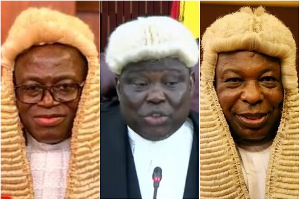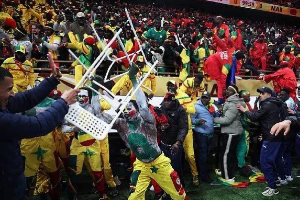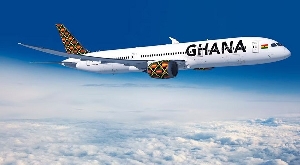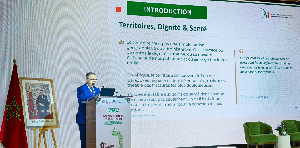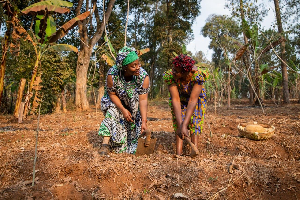In an era when the free market ideology has almost bankrupt the world leading economies and left millions of poor around the world on the economic scrap heap, few public officials or candidates from both the ruling National Democratic Congress and opposition New Patriotic Party have much to say about the persistence of poverty in Ghana. Yet two politicians, the current Vice President John Mahama and Dr Arthur Kobina Kennedy, (former Communications Director of NPP and both products of Dr Kwame Nkrumah’s educational policies, where every child regardless of social class, was given the same opportunity to become successful) have only one mission – to eradicate poverty in their homeland, Ghana and give opportunity to every Ghanaian to share in Dr Kwame Nkrumah’s “Ghanaian dream”.
Ironically both Mahama and Kennedy admire the educational and social mobility policies of the late President and father of the country, Dr Kwame Nkrumah. Mahama has firmly cast his mast to the Nkrumaist agenda.
While Dr Kennedy anchored his presidential campaign in 2008 with the corruption and poverty theme, about riding the country of corruption among officialdom and eradication of poverty, John Mahama, was also engaged with a similar theme about bridging the economic gap between the three Northern Regions/Savannah belts (northern half of Brong Ahafo and Volta Regions) and the southern half of the country. Both see public service as a call to serve their homeland and not for personal enrichment or gain.
John Mahama and Arthur Kennedy, two of the brightest politicians in modern times, have not only resurrected the rhetoric of making a change, but have pinned their hopes for the presidency in 2016 on a strategy of connecting to the Ghanaian people and equitable distribution of resources among all the regions.
Since December 2008 elections, Kennedy and Mahama have been talking about how to reduce poverty in the country. Both Kennedy and Mahama have the opportunity to not stay in their adopted countries abroad, but decided to choose the call of duty to serve at home, a discipline that was imbued in them during their formative years in Ghana (secondary boarding school system). Mahama and Kennedy’s generation (the student aluta years) loyalty to country is beyond question. They emerged at the period that Ghana was going through immense economic and social crisis. The group of student leaders that emerged at the period in question, including Kennedy and Mahama put the love of country first before self. These group of students were ready to sacrifice their academic work and to some degree their lives to defend the rights of the less priviledge in their homeland. Both Mahama and Kennedy agrees that unlike their day, the pschology of poverty today has reduced the spirit and love for dying for country and has been replaced by monetary equation. Kennedy stated, “We the leaders would need to show that we are more patriotic in the art of leadership and selflessness by tackling poverty head on and giving every Ghanaian the chance and opportunity to share in the Ghanaian dream, a dream that propel us (Mahama and I) into forefront of leadership”.
In 2016, swing regions like Central and Western regions (Kennedy’s home regions), the three Northern regions( where Mahama hails from) and Brong Ahafo region where an increase in voter turnout among the rural folks could make a difference in outcome for the race for Flagstaff House – Mahama, under his pet project, the Savannah Accelerated Development Authority, is championing the development of the three Northern Regions and the Savannah belt of Brong Ahafo and Volta Regions, while Dr Kobina Kennedy is in the process of establishing an organisation to help the citizens in Western and Central Regions to establish small scale industries and education development and later extend it nation wide.
Dr Kobina Kennedy started his poverty campaign among his compatriots in North America and Europe. He often reminded his compatriots in Diaspora of the need to “repay the moral debt” they owe the motherland. In a speech he gave in Chicago, Illinois some few years back, Kennedy, visibly emotional said, “Looking at the level of poverty in my homeland is not only unjust, it is immoral, and we need to do something about it”. That same year, Dr Kobina Kennedy returned home.
John Mahama is one of the few northern politicians who have been at the fore front of the fight to help uplift his compatriots from abject poverty. During his time in opposition, Mahama have been promoting grassroots campaigns self help in the north. During one such campaign, Mahama said “The best anti-poverty strategy is to equip the people to become self sufficient in food production”. He further stated that, “I am very committed to moving the people of the three northern regions out of poverty”. The floods that devastated the three northern regions did have a great impact on Mahama. In a speech in Tamale, Ghana’s third city and capital of the north, he said the floods made the poor impossible to ignore.
During the December 2008 election campaigns, Mahama is often heard to say, “We must keep Dr Nkrumah’s promise of opportunity for all”, a theme that he has taken into government, by ensuring that not only the poor in his native north, but every Ghanaian deserves to have the same opportunity.
Dr Kobina Kennedy, who is a physician by profession, wants to build a working society where every Ghanaian who works hard has the rewards to show for it. Kennedy and Mahama’s eagerness to work with the poor and the jobless youth put them closer to the progressive wing of Ghana politics. Some in the media have argue that Kennedy and Mahama’s politics put them closer to the kind of politics that Dr Kwame Nkrumah embraced during the independence struggle years, when Dr Nkrumah built a campaign that included market women, labour unions, the youth and the poor that catapulted him to the Castle.
Surveying the havoc caused by the floods in the north, John Mahama vowed to bring development to his people. He stated that, “whatever the situation my purpose of being here is trying to raise the issue of abject poverty and lack of basic infrastructure in the north and get people engaged in what is a great moral issue”.Mahama observes that poverty has become a “personal issue and moral crusade”. On the issue of health, both Mahama and Kennedy acknowledge during the December 2008 election campaign that a growing number of Ghanaian people are without health insurance because they cannot afford it and said something must be done. Now in government John Mahama has the chance to reform the National Health Insurance scheme.
Kennedy and Mahama are clearly positioning themselves for 2016 by moving to the centre left by proposing broad-based social policy programs, with Kennedy going further by commenting on the need for health savings insurance for all working people.
In government, John Mahama and his advisors are exploring policy ideas to promote job creation, job training, affordable health care, decent housing and a social insurance that protect people through retirement and sickness. Mahama is examining policies that not only would increase poor families’ incomes but also gives them the opportunity to move out of poverty. Many scholars and commentators, including this writer, have pointed out to class disparities in incomes and family assets between the rich and the poor. This writer went further to state that the only way to bring the disparity down is through provision of physical infrastructure, especially in the rural areas which would halt the rural urban migration. The three northern regions present a great opportunity where the region can tape into its comparative advantage of constant sunshine into Ghana’s green energy base.
Kennedy on the other hand identifies other issues such as bad schools, absent parents, especially in the big metropolis and a subculture that glorifies gangsterism. Kennedy stated that all these issues intertwined with those of Mahama and thus needs concerted effort across board. Both Mahama and Kennedy explicitly agree that the poverty rate is significantly higher than policy makers have stated.
Although 2016 is a long way from 2009, Mahama and Kennedy are hoping to prove that promoting an agenda that put the poor at the heart of policy making – decent housing, education and health care for all can win the hearts and minds of Ghanaian voters, come 2016.
Peter Jeffrey
Opinions of Wednesday, 13 May 2009
Columnist: Jeffrey, Peter


